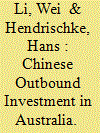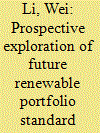|
|
|
Sort Order |
|
|
|
Items / Page
|
|
|
|
|
|
|
| Srl | Item |
| 1 |
ID:
109621


|
|
|
|
|
| Publication |
2011.
|
| Summary/Abstract |
Studying the popularization of solar water heaters (SWHs) is significant for understanding China's transition to green energy systems. Using Dezhou as a case study, this paper presents new angles on analyzing SWH deployment in China by addressing both the economic potential and the institutional dimensions at the local level. Using estimates from the demand-side of hot water for a typical three-person household in Dezhou, the paper evaluates the economic potential of a SWH in saving electricity and reducing carbon dioxide emissions. Then, expanding the analysis beyond economics, we take an institutionalist approach to study the institutional factors that contribute to Dezhou's success in SWH adoptions. By examining the five main actors in Dezhou's energy regime, we find that Dezhou's SWH deployment is driven by an urge to develop businesses and the local economy, and its success results from at least five unique factors, including the development of SWH industrial clusters in Dezhou, big manufacturers' market leadership in SWH innovations, a tight private enterprise-local government relation, geographic location within the SWH industrial belt, and the adaptive attitude of Dezhou's households towards natural resource scarcity.
|
|
|
|
|
|
|
|
|
|
|
|
|
|
|
|
| 2 |
ID:
175563


|
|
|
|
|
| Summary/Abstract |
This article contributes to our understanding of Chinese corporate expansion into developed economies by using Australia as a case study of how, in the 2010s, Chinese firms began transiting from government-driven resource investment to entrepreneurial expansion in new industries and markets. We contextualize this process by demonstrating how changing market demand and institutional evolutions at home and in the host country created new motivations for Chinese investors. In particular, the decline of active government control in China over the overseas operations of Chinese firms and the more business-oriented regulatory regime in Australia empowered local subsidiaries of Chinese firms to become more entrepreneurial and explorative in their attempts to compensate for their lack of competitiveness and weak organizational capabilities. Consequently, Chinese firms brought their domestic experience and modus operandi to the Australian host market and collectively adapted and deployed dynamic capabilities such as the use of network linkages, experiential learning and corporate reconfiguration. We find that this transfer of capabilities was facilitated by the co-evolution of the Chinese and Australian institutional and market environments and has maintained Australia's position as one of the major recipient countries of Chinese outbound investment, opening the Australian economy to ongoing expansion and disruption.
|
|
|
|
|
|
|
|
|
|
|
|
|
|
|
|
| 3 |
ID:
078276


|
|
|
|
|
| Publication |
2007.
|
| Summary/Abstract |
Migrant workers, meaning those who used to be farmers but have left rural areas and found jobs in cities as a result of economic reform and rapid development in China, have made a significant contribution to the burgeoning labor market and played an important role in speeding up the transition from a planned to a market economy. This present paper considers the economic status and social attitudes of migrant workers. It is based on the analysis of a large-scale survey in 2006, which was conducted using questionnaires and covered 28 provinces, municipalities and autonomous regions throughout the country. It was found that the income status of migrant workers depends heavily on the education and technical skills that they have developed, rather than on identity-based discrimination. Surprisingly, it was also found that those on less income and of lower economic and social status show more positive attitudes to society than those who are affluent and considered of higher social status. It is concluded that the decisive factor in attitude and behavior of migrant workers is historic rather than economic.
|
|
|
|
|
|
|
|
|
|
|
|
|
|
|
|
| 4 |
ID:
166391


|
|
|
|
|
| Summary/Abstract |
The shortage of traditional energy sources and environmental pollution caused by the consumption of fossil fuels have become increasingly prominent, and many countries regard the development of renewable energy as important for ensuring energy conservation and emission reductions. In addition, renewable portfolio standard is important for China to achieve energy transition. The Chinese government is actively promoting the construction of a renewable portfolio standard system. Considering different renewable energy development targets for renewable portfolio standards, this paper establishes a dynamic computable general equilibrium (CGE) model to research the impacts of achieving various policy targets. The main simulation results are as follows. Promoting renewable sources would have a slightly negative impact on macroeconomics. For each additional percentage point in the share of renewable energy generation in 2030, the loss of GDP would increase by approximately 9.11 billion RMB. A renewable energy policy could be also conducive to carbon emission reduction and energy structure adjustment. Certainly, the proportion of renewable energy in the total power generation should be approximately 34% to achieve the government target for non-fossil fuels to account for approximately 20% of the primary energy consumption by 2030.
|
|
|
|
|
|
|
|
|
|
|
|
|
|
|
|
|
|
|
|
|